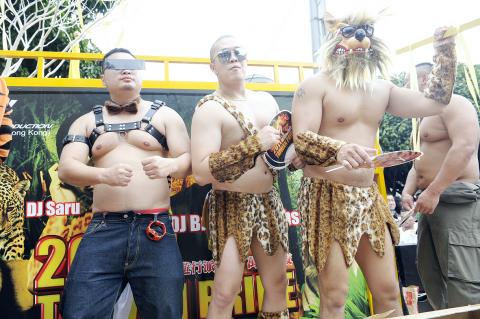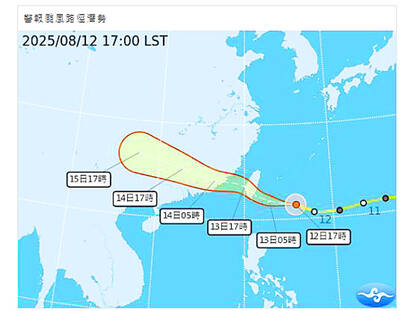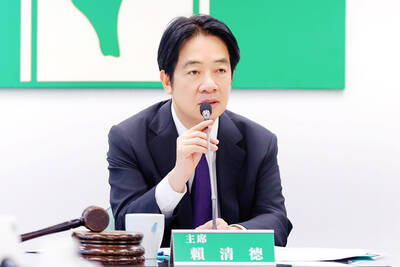With music, self-made signs and creative costumes, an estimated more than 30,000 people from across Taiwan and several other countries yesterday marched through the streets of Taipei during the annual Taiwan Lesbian, Gay, Bisexual and Transgender (LGBT) Pride parade, being held for the ninth consecutive year, calling for an end to discrimination against sexual minorities.
Tens of thousands of people poured onto Ketagalan Boulevard, the departure and ending point of the parade hours before 2pm, when the parade was scheduled to depart.
Participants carried balloons and self-made placards with slogans supporting gay rights and opposing discrimination, and many also dressed in special costumes to show their support for diversity.

Photo: George Tsorng, Taipei Times
Although the atmosphere was festive, the objective of the parade was serious.
“We are standing here together — whether you belong to the LGBT community or not — to fight back against discrimination against the LGBT community in this country,” one of the organizers of the parade, nicknamed A-Cheng (阿正), told the crowd. “Discrimination against LGBT people may seem to have decreased, but in fact, it’s still there, it just changed its form and was ‘upgraded.’”
He said that 10 years ago, LGBT communities were confronted directly by people who called them all sorts of names, but “nowadays, people would tell you: ‘I don’t have any problems with gays, but ...’ What comes after the ‘but’ could be: ‘I don’t think gays should be able to legally get married,’ ‘students should not be taught about homosexuality at school,’ or something else that’s still discriminatory in nature.”
J.J. Lai (賴正哲), co-founder of the first Taiwan LGBT Parade in 2003, said the situation may have improved a little, but discrimination from the general public and politicians still exists.
“Nine years ago, we departed from the 228 Peace Park with only a few hundred people. Today, we’re on Ketagalan Boulevard with more than 30,000 people,” Lai said.
“Nine years ago, there was only one Taiwan LGBT Pride Parade in Taipei, but this year parades are taking place in Taipei, Taichung, Kaohsiung and Hualien,” he added. “We can’t deny there have been changes. However, we should not overlook the threats posed by homophobic people and organizations.”
Lai accused President Ma Ying-jeou (馬英九) of having broken his campaign pledges four years ago that he would promote LGBT rights in his policies.
“Four years have passed and he’s running for his second term, but we’re still not getting what he promised — it’s all bullshit,” he said.
While Democratic Progressive Party presidential candidate Tsai Ing-wen (蔡英文) promised to legalize civil unions, Lai said he was disappointed that Tsai said such a policy should be implemented only “when there’s consensus in society.”
“If there’s social consensus, why would we need you, politicians, to push for it?” Lai said. “We don’t care whether Ma is gay or Tsai is a lesbian, we want actual policies benefiting the LGBT communities.”
Part of the parade marched through neighborhoods around National Taiwan Normal University, where many conservative families live, hoping that the residents would acquire a better understanding of LGBT communities through more contact, organizers said.
After the parade, demonstrators rallied on Ketagalan Boulevard and stepped on the ground 100 times, a gesture meant to represent that gay rights have gone nowhere, despite the efforts.

GET TO SAFETY: Authorities were scrambling to evacuate nearly 700 people in Hualien County to prepare for overflow from a natural dam formed by a previous typhoon Typhoon Podul yesterday intensified and accelerated as it neared Taiwan, with the impact expected to be felt overnight, the Central Weather Administration (CWA) said, while the Directorate-General of Personnel Administration announced that schools and government offices in most areas of southern and eastern Taiwan would be closed today. The affected regions are Tainan, Kaohsiung and Chiayi City, and Yunlin, Chiayi, Pingtung, Hualien and Taitung counties, as well as the outlying Penghu County. As of 10pm last night, the storm was about 370km east-southeast of Taitung County, moving west-northwest at 27kph, CWA data showed. With a radius of 120km, Podul is carrying maximum sustained

Tropical Storm Podul strengthened into a typhoon at 8pm yesterday, the Central Weather Administration (CWA) said, with a sea warning to be issued late last night or early this morning. As of 8pm, the typhoon was 1,020km east of Oluanpi (鵝鑾鼻), Taiwan’s southernmost tip, moving west at 23kph. The storm carried maximum sustained winds of 119kph and gusts reaching 155kph, the CWA said. Based on the tropical storm’s trajectory, a land warning could be issued any time from midday today, it added. CWA forecaster Chang Chun-yao (張竣堯) said Podul is a fast-moving storm that is forecast to bring its heaviest rainfall and strongest

President William Lai (賴清德) yesterday criticized the nuclear energy referendum scheduled for Saturday next week, saying that holding the plebiscite before the government can conduct safety evaluations is a denial of the public’s right to make informed decisions. Lai, who is also the chairman of the Democratic Progressive Party (DPP), made the comments at the party’s Central Standing Committee meeting at its headquarters in Taipei. ‘NO’ “I will go to the ballot box on Saturday next week to cast a ‘no’ vote, as we all should do,” he said as he called on the public to reject the proposition to reactivate the decommissioned

TALKS CONTINUE: Although an agreement has not been reached with Washington, lowering the tariff from 32 percent to 20 percent is still progress, the vice premier said Taiwan would strive for a better US tariff rate in negotiations, with the goal being not just lowering the current 20-percent tariff rate, but also securing an exemption from tariff stacking, Vice Premier Cheng Li-chiun (鄭麗君) said yesterday. Cheng made the remarks at a news conference at the Executive Yuan explaining the new US tariffs and the government’s plans for supporting affected industries. US President Donald Trump on July 31 announced a new tariff rate of 20 percent on Taiwan’s exports to the US starting on Thursday last week, and the Office of Trade Negotiations on Friday confirmed that it